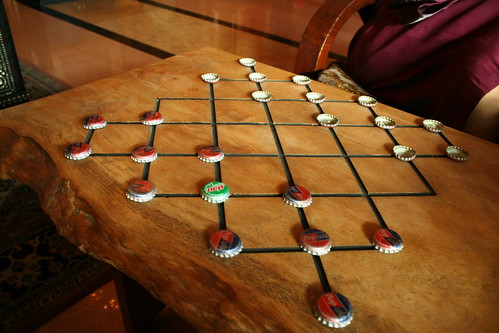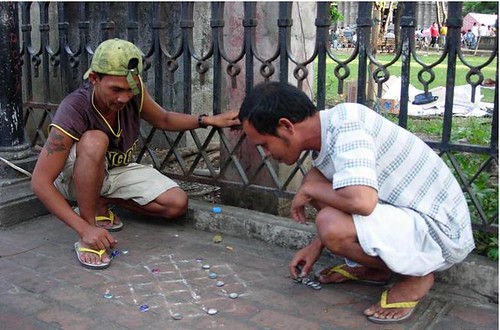
-
МјРЇСІИёСЖШИМі
-
 MINUTE TO WIN IT
MINUTE TO WIN IT 46,766
46,766 -
 Apple Eating Contest Game
Apple Eating Contest Game 34,215
34,215 -
 SINGING BEE
SINGING BEE 23,709
23,709 -
 DEAL OR NO DEAL23,338
DEAL OR NO DEAL23,338 -
 rodeo masbatenio19,409
rodeo masbatenio19,409 -
 Luksong Lubid14,258
Luksong Lubid14,258 -
 EGG AND SPOON RACE12,235
EGG AND SPOON RACE12,235 -
 Tumbang Preso12,155
Tumbang Preso12,155 -
 HULA HOOP12,146
HULA HOOP12,146 -
 BUNONG BRASO ( ARM WRESTLING)12,110
BUNONG BRASO ( ARM WRESTLING)12,110
Damath Game
Dama is a famous traditional board game in the Philippines. The game is
played in a wooded board with 10 squares and 14 end points. Today,
Dama has evolved from a mere Filipino pastime to an educational tool in
the Philippines, with the introduction of Damath.
History
Countries around the world have their own versions of the game
called "checkers", a name which gets its roots from North America.
In the Philippines and in Armenia, the game is called dama.
According to experts, the game actually originated from
Ancient Egypt. Archaeologist found traces of the game in an
excavation dig in Ur, Iraq and speculated that the game existed
at around 1400 B.C. Ancient Egyptians called the game
"alquerque", which had a 5x5 board with a grid and diagonal
lines intersecting the grids. There were only 10 pieces per side,
moving along the intersections. Historians claimed the invention
of modern checkers evolved from the 12th century game they
called "ferses" (or "fierges") which combined the rules of
alquerque with the chess. Around the 16th century, the game's name evolved to "dames" and became popular in France. The game
was then exported to England and America where the British
called it "draughts". In a related research, historians found
books written on the game in Spain and in England.
Playing Dama
The game is played by two people, each with 12 pieces
of pitsas made from bamboo, stones, or bottle caps. Player
position the 12 pieces of "pitsa" on the end points of the
diagram. They move from point to point, and like chess,
the game ends once the opponents pitsas are caputured.
In some parts of the Philippines, the game is played using
a chess board and its pieces. The pawns, knights, and
rooks are usually used at the start, while the kings, queens,
and bishop are used when a player reached the "dama".
The "dama stage" is reached when a player gets his
piece to the last row of the board.
There are also several other versions of dama within the
Philippines. One of which is the popular "pildi-dama"
(or perdigana) which comes from a Bisayan word "pildi"
which means "to lose".
Important Notes
- The pitsas can only move diagonally along the intersection of lines or
squares in chessboards.
- Pitsas cannot eat or capture backwards.
- Pieces that have reached the "dama stage" can move from row to row
diagonally.
In the Philippines, dama has evolve to be a popular educational
activity, which is known as "Damath." The word comes from
the game "dama" and Mathematics. The game is a combination
of dama as a stategy game and mathematical operations.
The game then boosted its popularity and since then the game
has been played in schools in the Philippines with national
tournaments held every year. Today, the game has also
evolved to "Sci-Damath" which is a combination of Damath
and scientific operations.

- ЁЄ

- ЁЄSalapan Festival
- ЁЄEmpanada Festival (Batac City)
- ЁЄPADUL-ONG FESTIVAL
- ЁЄKaumahan Festival in Barili
- ЁЄKAGASANGAN FESTIVAL
- ЁЄLalin Festival in Asturias
- ЁЄTinabuay Festival
- ЁЄGayon Bicol Festival
- ЁЄPINYASAN FESTIVAL in CAMARINES
- ЁЄMAGAYON FESTIVAL
- ЁЄBANAUAN FESTIVAL (BARANGAY.GUA
- ЁЄThe Tuna Festival in Gensan
- ЁЄPINTOS FESTIVAL BOGO CITY, CEB
- ЁЄPanaad sa Negros



- ЁЄ
- ЁЄCEBU WESTOWN LAGOON
- ЁЄGREEN LAGOON, COMPOSTELA
- ЁЄCALLAO CAVE
- ЁЄMOUNT PINATUBO IN PHILIPPINES
- ЁЄBATAN ISLAND in Batanes.
- ЁЄCALAGUAS ISLAND, CAMARINES NOR
- ЁЄAGHO ISLAND
- ЁЄCARAMOAN ISLAND IN CAMARINES S
- ЁЄSAMBAWAN ISLAND
- ЁЄPLACES TO VISIT IN LANAO DEL N
- ЁЄPLACES TO VISIT IN ZAMBOANGA C
- ЁЄPlaces to visit in Rizal Provi
- ЁЄHISTORIC TOWN OF VIGAN CITY, I
- ЁЄCAMBUGAHAY FALLS, SIQUIJOR ISL













 ЧЪРкДхФФ ОпАЃЛѓДу ПРЧТ
ЧЪРкДхФФ ОпАЃЛѓДу ПРЧТ 13ГтПЌМг МвКёРкИИСЗ 1РЇ
13ГтПЌМг МвКёРкИИСЗ 1РЇ

 ГЛАд ИТДТ ОюЧаПј УЃБт
ГЛАд ИТДТ ОюЧаПј УЃБт
 ИЎОѓ ЧаБГ ЙцЙЎБт
ИЎОѓ ЧаБГ ЙцЙЎБт
 СжИЛПЁ ГЛАЁ ОЕ КёПыРК?
СжИЛПЁ ГЛАЁ ОЕ КёПыРК? УжАэАЁМККё РЬКЅЦЎ СёБтБт
УжАэАЁМККё РЬКЅЦЎ СёБтБт
 ЧіСіПЁМЕЕ ЧЪРкДхФФ!
ЧіСіПЁМЕЕ ЧЪРкДхФФ! ЧіСіПЁМ АЁДЩЧб
ЧіСіПЁМ АЁДЩЧб









 ЧЪРк ЦЏБо Ч§ХУ! ФСНУОюСі МКёНК
ЧЪРк ЦЏБо Ч§ХУ! ФСНУОюСі МКёНК







































